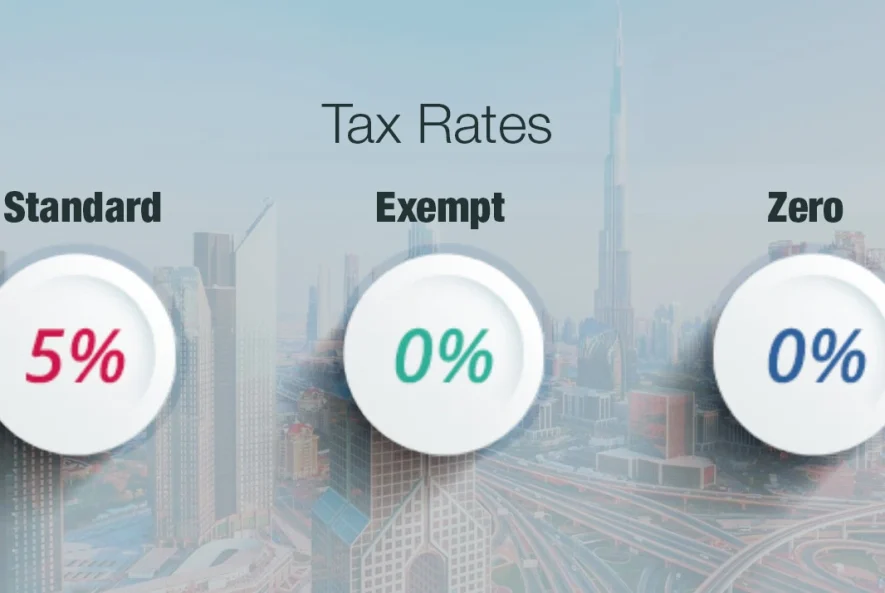
- May 12, 2025
How Does the VAT System Work in Dubai, and Who Needs to Register for VAT?
The introduction of Value-Added Tax (VAT) in Dubai has significantly impacted the business landscape. As part of the UAE’s broader tax reforms, VAT was implemented on January 1, 2018, to diversify government revenues and reduce the reliance on oil exports. For business owners and entrepreneurs setting up their companies in Dubai, understanding how the VAT system works and determining whether they need to register for VAT is important. In this comprehensive guide, we will provide an in-depth explanation of everything you need to know about VAT in Dubai, including who is required to register, the registration process, VAT rates, and its impact on business operations.
What is VAT, and Why Was It Introduced in Dubai?
VAT is a consumption tax placed on goods and services at each stage of the production or distribution process. In Dubai, VAT is applied at a standard rate of 5%, with certain goods and services either exempt or zero-rated. The tax is paid by consumers but collected and remitted to the government by businesses. The introduction of VAT aligns with global trends in tax reform and aims to support the UAE diversification plans, reduce dependency on oil revenues, and enhance public infrastructure and services.
Why VAT is Important for Dubai Businesses
- Revenue Generation: VAT helps generate additional government revenue, which is reinvested into public services and infrastructure.
- Global Business Compliance: As Dubai businesses increasingly engage in international trade, VAT compliance ensures they remain competitive and aligned with global standards.
- Tax Incentives: Some Free Zones in Dubai offer VAT exemptions, making them a favourable destination for specific business setups. Now that we have a basic understanding of VAT, let’s explore how it works in Dubai and who needs to register.
How Does the VAT System Work in Dubai?
Dubai applies a standard VAT rate of 5% on most goods and services, which is relatively low compared to other countries globally. However, not all items are subject to this tax. There are zero-rated and exempt categories:
The VAT Rate in Dubai
- Zero-Rated Goods and Services: Certain goods and services are exempt from VAT at a rate of 0%. These include certain healthcare services, education, and exports.
- Exempt Goods and Services: Exempt items are not subject to VAT. These include certain financial services, residential real estate, and local transport. Businesses in Dubai are responsible for collecting VAT from their customers and remitting the collected amount to the government. The VAT system operates on a self-assessment basis, meaning businesses must regularly account for and pay VAT.
VAT Registration Threshold
When new and old business setup in Dubai are required to register for VAT if their taxable supplies and imports exceed a certain threshold, there are two main registration categories:
1. Mandatory VAT Registration
Businesses must register for VAT if their annual taxable turnover exceeds AED 375,000. This threshold applies to all companies engaged in taxable activities, regardless of the industry.
2. Voluntary VAT Registration
Businesses with taxable turnover between AED 187,500 and AED 375,000 may voluntarily register for VAT. While not mandatory, this option can help companies reclaim VAT on expenses and streamline their financial operations.
How Businesses Collect and Pay VAT
Businesses that are registered for VAT in Dubai must:
- Charge VAT on Sales: Registered companies must charge VAT on taxable supplies (sales of goods and services).
- Issue Tax Invoices: VAT-registered businesses must issue invoices that display the VAT amount.
- Pay VAT on Purchases: When businesses buy goods or services, they pay VAT to their suppliers. Companies can reclaim the VAT paid on these purchases, a process known as input tax recovery.
- File VAT Returns: Businesses must file VAT returns to the Federal Tax Authority (FTA) quarterly or annually, depending on their turnover. The returns must include VAT collected on sales and VAT paid on purchases.
Who Needs to Register for VAT in Dubai?
As mentioned earlier, businesses are required to register for VAT based on their annual taxable turnover. However, several other factors can influence whether VAT registration is necessary or beneficial.
1. Businesses with a Turnover Above AED 375,000
Businesses that expect their taxable supplies (sales of goods and services) to exceed AED 375,000 per year are legally required to register for VAT. This includes companies in the retail, manufacturing, service industries, and other sectors.
2. Voluntary Registration
Businesses that expect their taxable supplies to be between AED 187,500 and AED 375,000 can voluntarily register for VAT. Voluntary registration enables businesses to reclaim VAT on their business-related expenses, providing a financial advantage, particularly for those starting or incurring substantial capital expenditures.
3. Non-Resident Businesses
Non-resident businesses that conduct taxable activities in Dubai may also be required to register for VAT. Even if the business has no permanent establishment in Dubai, it may still need to comply with VAT registration and filing requirements for specific activities, such as selling goods online.
4. Small Businesses Under the Threshold
VAT registration is not mandatory for businesses with a taxable turnover of less than AED 187,500. However, businesses not registered for VAT cannot reclaim VAT on business-related purchases, which might make it less advantageous for companies with significant expenses.
5. Exemptions for Certain Industries
Some sectors, like education, healthcare, and real estate, may have specific exemptions or different VAT treatment. Understanding the VAT status of your industry before registering is essential.
The VAT Registration Process in Dubai
The VAT registration process in Dubai is straightforward but requires careful preparation. Here’s a register:
1. Gather the Required Documents
Before registering, you will need to prepare the following documents:
- Trade license or company registration certificate.
- Passport copies of the business owner(s).
- Proof of business address.
- Financial statements or records demonstrating your turnover.
2. Submit Your Application Online
You can apply for VAT registration through the Federal Tax Authority (FTA) online portal. The FTA will review your application and notify you of the status.
3. Receive Your VAT Registration Number
Once registered, you will receive a VAT registration number that must be included on all VAT-related invoices and documents.
4. Compliance with VAT Filing and Payment
After registration, businesses must comply with VAT return filing and payment schedules. Non-compliance with VAT obligations can result in fines and penalties.
Key Benefits of VAT Registration for Businesses
- Reclaim Input VAT: VAT-registered businesses can reclaim VAT paid on goods and services purchased, improving cash flow and reducing costs.
- Improve Business Credibility: Being VAT-registered can enhance your business’s credibility, making it appear more professional and compliant with local laws.
- Access to Government Contracts: Many government contracts and tenders, especially for large projects, require businesses to be VAT-registered.
FAQS About VAT Registration in Dubai
Dubai standard VAT rate is 5%, which applies to most goods and services. However, certain items are exempt or zero-rated.
Businesses with an annual taxable turnover above AED 375,000 must register for VAT. Businesses with a turnover between AED 187,500 and AED 375,000 can voluntarily register.
Failure to register for VAT when required can result in fines and penalties imposed by the Federal Tax Authority (FTA) and backdated tax liabilities.
VAT returns must be filed quarterly or annually, depending on the size of your business and turnover.
Yes, businesses with a taxable turnover below AED 187,500 are not required to register for VAT.
Conclusion: Ready to Register for VAT?
Understanding how the VAT system works in Dubai is crucial for businesses of all sizes. Whether you are a startup or an established enterprise, registering for VAT ensures compliance with local laws and offers various financial benefits.
If you are unsure about the VAT registration process or need assistance with business setup in Dubai, contact Silver Oak Biz today. Our team of experts can help you navigate the VAT system, ensuring your business stays compliant while maximising its financial potential. We also offer Corporate Tax Filing and Corporate Bank Account Assistance in UAE.



